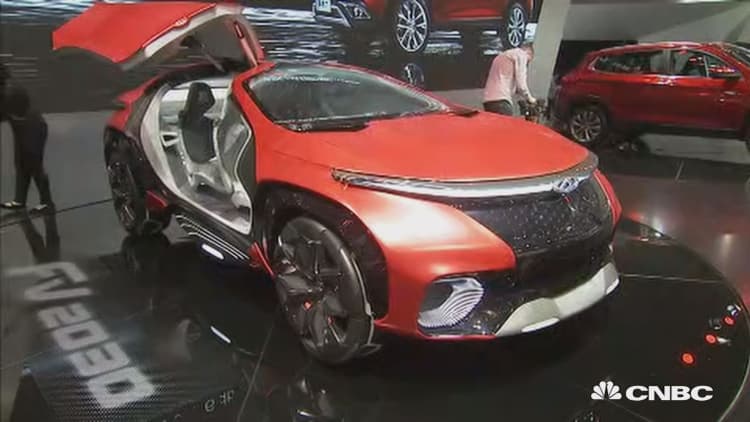


All eyes are on sports utility vehicles (SUVs) at this year's Beijing Auto Show, where industry stalwarts are racing against local rivals to indulge the mainland's growing thirst for larger vehicles.
"The SUV market [in China] seems to be insatiable...You're only going to see it accelerate," Mark Reuss, General Motors' (GM) executive vice president of global product development, told CNBC.
On Monday—when the 10-day event opened to the media— leading international players, including Mercedes, Honda Motor, Ford, Volkswagen and GM, displayed new SUVs, many of which were "concept cars," or models showcasing new styling and technology not yet being mass-produced for the public. Volkswagen's T-Prime Concept GTE, for example, is a plug-in hybrid with a high-tech dashboard.
"There is an increase in demand for large cars in China, with automakers now talking about increasing space and the number of people that can fit into an SUV," Namrita Chow, principal analyst at research house IHS Automotive, said.
"For example, Ford has added a third row to their Edge SUV, making it a 7-seater from the normal 5-seater in other markets. These are trends that automakers are using to gain market share in China."
SUV sales on the mainland soared an annual 52 percent in 2015, one of the few auto segments continuing to grow, according to IHS. In March alone, Chinese SUV demand expanded 46.2 percent on-year, Fitch Ratings said in a new report on Monday, citing "manufacturer-led price cuts of best-selling models, indicating intensifying competition in the SUV segment."
So far, international brands still lead the way, despite the cheaper prices offered by homegrown brands, Chow said.
Changan Auto's CS35 model, the Chongqing-based firm's first foray into the SUV arena, starts off at just $10,000 but international executives seem unperturbed by such competitive pricing.
"We're going to differentiate ourselves on quality, connectivity, durability, and we'll be competitive in the price part of it too," remarked Reuss.
But new regulations could test the resolve of foreign brands.
The world's second-largest economy intends to tighten up car emission standards by 2017 in an attempt to curb pollution, with the new rules expected to slash by as much as half the amount of emissions allowed by gasoline-powered and heavy diesel-fueled vehicles, according to Reuters.
This week, Toyota said the new rules would delay the Japanese automaker's ability to hit its target of selling 2 million vehicles a year in China by 2025.
But companies are increasingly finding new ways to survive in a stricter fuel economy world.
Automakers are now using turbo chargers with smaller engines as well as creating lighter vehicles to reduce fuel economy, noted Chow.
The Beijing Auto Show is held every two years on an annually-alternating basis with the Shanghai Motor Show.



